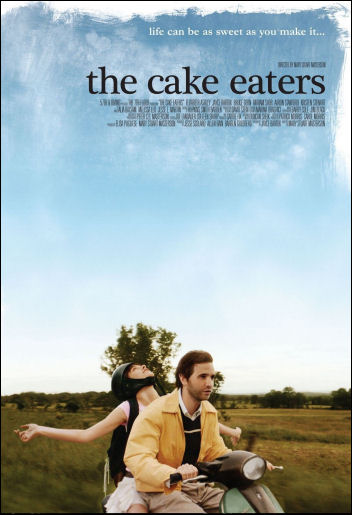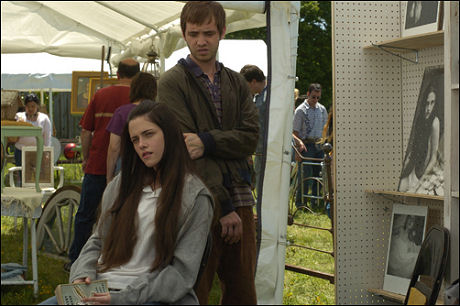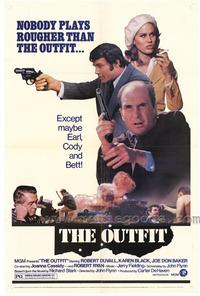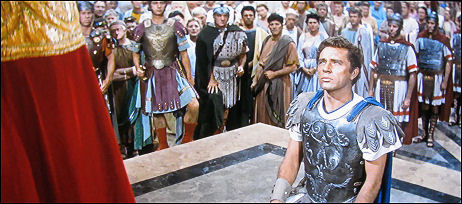Whenever a guy goes postal, nobody who knew him in any capacity ever cops to noticing anything askew about his manner. (Has a woman ever gone on a shooting rampage?) The guy is invariably described as nice, quiet, considerate, well liked, etc. Because admitting to having noticed even the faintest sense of turbulence or unrest in a shooter-to-be would mean that the observer might be regarded as being very slightly responsible for the carnage. It’s safer to say you detected nothing.
Five Out of Seven
Speaking as a full-fledged workaholic, I’m guilty of all of these bad workaholic habits except for the drinking and the fast food. Okay, I still go to Burger King now and then. But since living in NYC I’ve done a lot more walking
Pushing Hard Enough?
Holllywood & Fine‘s Marshall Fine has creamed twice over Mary Stuart Masterson‘s The Cake Eaters, two days in a row — yesterday and today. It opens Friday in an assortment of indiewood theatres.

It’s my fault that I haven’t gotten to this. I was invited by a PMK/HBH publicist pal in Los Angeles, but I didn’t try to reach the local NYC rep and she hasn’t tried to reach me. Hello, Lauren Auslander! In fact, hello to all the NYC publicists whom I’m still having to chase in order to go to screenings.
“Everyone knows that this time of year is a dumping ground for movies,” Fine writes. “Theaters are awash in genre garbage and remakes or big-budget eye-candy whose producers or studios lack the stones to face the summer blockbuster competition (or, to put a kinder spin on it, they have the savvy to exploit a slack period in the schedule).
“Why does a spirited, intelligent little film like The Cake Eaters have to beg for a theatrical release? It opens in New York and a few other places this Friday and platforms from there – after more than two years of trying to find distribution (and shortly before its DVD release).
“Directed by Mary Stuart Masterson (yes, that Mary Stuart Masterson) from a script by Jayce Bartok (who plays a lead role in the film), The Cake Eaters is a drama with a thread of romantic comedy that deals with grief, regret and hope. Set in a small town in upstate New York, it’s a charming anachronism — a movie in which people actually talk to each other, minus such modern accessories as cell phones or e-mail.

“Though grief is the subtext of the film, life is the subject. Masterson draws beautifully modulated performances from her strong ensemble cast, particularly Kristen Stewart and Aaron Stanford as the unsure but indomitable young lovers.
“Stewart blends delicate emotions with strength of character in a subtle performance that focuses on the character’s wicked wit, without ignoring her physical infirmity. Stanford makes [his character] both inexperienced and sincere, a guy who is pleasantly surprised to discover that a girl’s expectations of him match the ones he has for himself but has kept hidden for too long.
“The Cake Eaters balances sweetness and sadness without ever leaning too heavily on either quality. It’s unfortunate that the market seems to willfully ignore nicely etched little films such as this one – and a feat to be celebrated that this one has broken through for a theatrical run at last.”
I have to be honest and admit that I didn’t try as hard as I could to see this film because I don’t care for the title. I don’t like cake as a dessert or a metaphor. I’ve always shied away from using “you can have your cake and eat it too.” Which doesn’t quite synchronize with Marie Antoinette‘s infamous “let them eat cake” line. I could let every cake manifestation go and not miss any of them for the rest of my life. That said, I’d like to see the film.
Kill The Capital “I”
There will come a day when all the online, newspaper and magazine editors who’ve insisted on capitalizing the “i” in internet for the last 15 years or so will try to evade responsibility for this. They’ll look colleagues in the face as they deny supporting it — “Who, me?” — when in fact they’re now enforcing one of the most outrageous and illogical style charades in editorial history.
The internet is a network of technological realms and pathways that enable the exchange of digitally-coded information. Just as the nation’s highway system is a network of elevated and land-topped concrete roadways that enable vehicles of all sizes to travel just about anywhere in the country. And yet nobody ever refers to the nation’s “Highway” system. And nobody writes about “Radio Waves.” Nobody refers to “Broadcast or Cable or Satellite Dish” television. And yet the N.Y. Times style charlatans insist, year after year after year, on the “Internet” spelling.
Every time I see this my face begins to redden and my teeth grind in rage. It’s spelled internet — no ifs, ands or buts. And I don’t want to hear any specious arguments in favor of sticking with the capitalization. It’s a moronic rule.
Outfit Forever
35 years and six months ago, Roger Ebert wrote a perceptive, positive and fair-minded review of John Flynn‘s The Outfit — a crafty, brass-tacks crime pic that I mention every so often in hopes of goading Warner Home Video into putting it out on DVD. My most recent mention was spurred by the recent death of Donald Westlake, who wrote the book the film is based upon.

Ebert called it “a classy action picture, very well directed and acted, about a gangster’s revenge on the mob for the death of his brother. An outline of the plot would make it sound pretty routine, but what makes the picture superior is its richness of detail. [In no small part because] the people in this movie are uncommonly interesting.
“The lead is a guy named Macklin, played by Robert Duvall. He and his brother made the mistake some years ago of sticking up a bank that was owned by the outfit. In revenge, his brother is wiped out by a couple of stone-faced gunsels. Duvall gets out of prison and hitches up with an old partner in crime, Joe Don Baker. They also take along Duvall’s girl (Karen Black), but mostly she just gets to ride in the back seat.
“Like so many movies of the last five or six years, this one is essentially about a relationship between two males. Duvall and Baker make it work better than usual by suggesting real, fundamental friendship and mutual respect, [being] just a couple of old pals who are quick and mean and very professional. And Duvall is reasonable, too; he doesn’t want total vengeance, he only wants a quarter of a million dollars. The outfit takes in more than that before noon on a good day — or so observes Robert Ryan, who plays the mob chief. But Ryan double-crosses Duvall, and then it turns out that for $250,000, he would have been getting off cheap.
“Duvall and Baker raid a series of mob operations, including a gambling club and a bookie wire room, and finally they raid the mansion of Ryan himself. The nice thing about all the raid sequences is that they’re carried out realistically; no James Bond gimmicks or impossible heroism, just a few well-executed plans.
“Flynn, who wrote and directed, fills The Outfit with a series of supporting characters who are allowed to seem complex and real. I especially remember a couple of dealers in hot cars and the nymphomaniac wife of one of them (Sheree North). And Marie Windsor, as Baker’s wife. And Ryan, in his next-to-last role, playing a man with great strength but very little happiness.
“The scene at the farm of the two stolen car dealers is handled with such attention to character detail that it could stand by itself; with a few small strokes, Flynn gives us three characters and their relationship, Instead of just throwing in some stock dialogue.
“There’s something else that’s good about the movie: The relative restraint with which Flynn uses violence. Instead of going for a lot of fancy gunplay, Flynn more often than not examines the way in which violent situations tend to be clumsy and confused. A scene in a skid row mission, for example, comes alive when Duvall and Baker, trying to escape a couple of hit men, set off a fire alarm. Bums and firemen and cops and killers all mill around trying to find the fire; it’s exciting, but it’s fun too.”
Sundance Crowns Cooper
When Geoff Gilmore left his Sundance Film Festival director gig on 2.17 for the shape-shifting, brand-expanding Tribeca Film Festival, I assumed right away that longtime Sundance program honcho John Cooper would take over. But it took Robert Redford and the Sundance board three weeks to come to the same conclusion. Variety‘s Dade Hayes has reported that Cooper faced competition from fellow Sundance vet Trevor Groth for the top job.
Fly on the Wall
A link to a 125-page transcript of a five-day-long conversation between Steven Spielberg, George Lucas (pre-demonic) and Lawrence Kasdan giving birth to Raiders of the Lost Ark. The talks happened between 1.23.78 and 1.27.78. What was I doing back then? Trying to pay the rent on my first New York apartment.
Blu-ray Robe
I wanted to see The Robe on Blu-ray because I wanted to really see what the very first CinemaScope film looked like in the finest technical sense. I’d seen it once before and knew, of course, that it’s not much of a drama. So getting the Blu-ray was strictly a visual looksee deal, and that’s what I got. Or all I got, for the most part.
Martyrobe from Hollywood Elsewhere on Vimeo
I’ve never read a positive critical re-assessment piece of The Robe. It’s not an awful film, but it’s certainly stiff and treacly and grandiose, and at times is bizarrely over-acted by Richard Burton. There’s never been a mainstream genre more tedious or lumbering than that of 1950s religious big-screen epics. They tend to be watchable only for the occasional supporting performance, the stately widescreen photography and the score (since the finest composers were always hired).
The only rich element in The Robe is Jay Robinson‘s flamboyant performance as Caligula. I’ve always preferred Demetrius and the Gladiators, the sequel to The Robe in which the squealing Robinson gets a spear through his chest at the climax. It also has Mature, several good gladiator fights, the stabbing deaths of four or five tigers, Susan Hayward, Richard Egan, Ernest Borgnine, and a stirring Franz Waxman score.
So how good looking is the Blu-ray Robe? Much of it is pretty damn beautiful. Or as beautiful as it can be given that the visual elements were never top-of-the-line.
The Robe was shot in 35mm with three or four smallish anamorphic lenses provided by Henri Chretien, a Frenchman who sold his “anamorphoscope” process to 20th Century Fox. In the early days CinemaScope seemed quite the marvel, but in hindsight it was the least of the widescreen processes. It wasn’t as rich as the 55mm process used for The King and I and Carousel, or the 65mm and 70mm processes that came along in the mid to late ’50s.

The CinemaScope image in The Robe appears muddy and over-saturated from time to time, and the original process gave a squeezed effect to people and elements on the sides of the screen.
But The Robe looks better on Blu-ray than I’ve seen it look before. It looks better than I ever imagined it might look. Handsome and needle-sharp for the most part, and even painterly at times. So to hell with the movie. Rent or buy this thing just to savor the shots. And to watch the extras, which are all nicely done.
It’s odd, however, that the doc about CinemaScope doesn’t mention the technical basics. One, the CinemaScope image was made to project an image at 2.66 to 1. Two, pasting a four-track magnetic sound track alongside the image took the aspect ratio down to 2.55 to 1. Three, the addition of an optical soundtrack (demanded by exhibitors) reduced it further to 2.39 or 2.35 to 1. None of this info is considered share-worthy. Weird.
Mumblecore Plus
I’ve watched two South by Southwest movies on disc today (on top of banging out that piece called “Things Change“). I’ll let the first one go but Joe Swanberg‘s Alexander The Last, which will show simultaneously at SXSW and on IFC Demand on Saturday, 3.14, is the shit. Seriously. I knew something a cut above was underway within two or three minutes.
Talk about your platinum calling-card movie for Swanberg and his two lead actresses, Jess Weixler (who won a 2007 Sundance Special Jury prize for her performance in Teeth) and Amy Seimetz.
The two guys they’re sort of paired off with, Justin Rice and Barlow Jacobs, are, for me, almost staggeringly nothing (I kept asking myself “why were these vessels of boredom even cast?” until I just gave up and put them out of my mind) but Josh Hamilton and Jane Adams add distinction with their small but intriguing supporting roles. But the movie itself is the thing. There’s a current going on that’s hard to describe. Something in the way it plays and breathes and almost looks the viewer in the eye. I couldn’t tear myself away.
It’s one of those rare mumblecore pieces in which you’re suddenly struck with a reality vibe that tells you right off the top that something else is happening. I was so into the feel and touch and naturalness of this film that I didn’t really care where Swanberg’s story, such as it is, was headed. I knew that something would manifest sooner or later, but mumblecore never really builds or develops or plants seeds in a North by Northwest-ian or Third Man-ish way so who cares in the first place? Either you find the actors intriguing and possessed of something more than manner, or you don’t.
Alexander the Last is more or less about a young blonde actress (Weixler, who looks a bit like Alicia Silverstone but is six or seven times more talented), and her nice, dorky, funny-looking musician husband (Rice) and a meant-to-be-hunky guy she’s performing with in a play (Jacobs, who has one of the worst haircuts I’ve ever seen on any actor in any movie in my entire life) and the emergence /appearance of infidelity. Seimetz plays Weixler’s sister, and it’s obvious from the first scene of (a pretend wedding ceremony) that they’re Bergman/Persona close. I thought there was a lesbian thing going on before I realized they were related.
But it’s not what happens in a storytelling sense as much as how it feels when this and that behavior manifests. We’re basically talking about a little movie made with a lot more skill and emotional realism and acting that sinks in much deeper than usual. It’s kind of a mumblecore-meets-dogma deal, which I’m tossing out as an eternal lifelong admirer of dogma movies and who never accepted or listened, even, to those who began trashing this movement starting about six or seven years ago.
I knew something good might happen when I saw that director-writer Noah Baumbach (Greenberg, Margot at the Wedding, The Squid and the Whale) is one of the producers along with Anish Savjani, who produced Wendy and Lucy, Nights and Weekends, Me, Myself, & I and Hannah Takes the Stairs.
Weixler is a well-respected, gainfully employed indie star waiting to happen in the bigtime. She needs to be cast in something alongside Jake Gyllenhaal or Brad Pitt or Sean Penn or somebody in that realm. She’s got it, that’s for sure. Seimetz is every bit her equal (and with fantastic gams, by the way), but I paid more attention to Weixler after that first kick-ass wedding vow scene. No offense.
And Swanberg is as good as it gets at this sort of thing, i.e., movies in which nothing happens except random attractions and couplings that aren’t quite right or holy and need to be kept under wraps. I just thought of something. You know who was also quite expert at making films about interesting, attractive people with wandering libidos in which nothing really happens? Michelangelo Antonioni. Swanberg isn’t close to his level, but the last time I was this absorbed by a film of this general type with almost no “story” was L’Eclisse. Which I’ll bet Swanberg has never seen.
I have no idea why this film is called Alexander The Last. I guess I’ll have to watch it again and listen more closely.
Things Change
In any real-life scenario, saying “I love you” to someone is a very dicey thing. It’s not a rumor — “show it, don’t say it” does tend to work. I know that an actor blurting this out to another in a movie is risk times infinity. One reason these words don’t appear that much in screenplays is that “I love you” can’t be confessed by just anyone. And I’m not saying that only great actors can say it and make it stick. The key thing is a mixture of open-heartedness and bravery and a kind of steadiness of the soul, and I’m not sure that’s something you can necessarily “act” with technique.
One of the very few times that I bought a simple declarative “I love you” was when suburban dad Robert De Niro said it to suburban infidel Meryl Streep in Falling in Love, that 1984 homage to Brief Encounter, in part because DeNiro said it clumsily. Another convincing sell came from Marlon Brando when he said it softly to Maria Schneider at the end of Last Tango in Paris. And I just watched a couple of women exchange marriage vows in a scene from Joe Swanberg‘s Alexander the Last, and they clearly believed what they were saying. As did I.
I know that if you’re going to blurt these words out in any kind of half-grounded drama, you have to convey at least two or three of these things: (1) the adolescent inside you is feeling enormous emotional vulnerability in voicing this confession, (2) you’re nonetheless transported, levitated, stunned and/or melted down by this realization, and therefore (3) you don’t care if the beloved returns the sentiment or not because you’re at one with the universe and the inner adolescent needs to face up and get down.
The reason I’m bringing this up is because I recently watched a certain actress say these three words in a film. She said them as plainly and honestly as she knew how (I guess), and there was just no buying it. The instant she said the words you could hear a spoonful of mashed potatoes hitting the kitchen floor….whup. Part of the reason is that as she’s gotten older she’s begun to radiate a certain guarded attitude about life and human nature that has felt a little bit like bitter, calloused and frosty (or some combination). What man or woman who’s lived and loved and been around doesn’t have some of this stuff rumbling underneath? The bottom line is that “I love you” and where this actress seems to exist in her head and heart feel like different realms. The old pitterpat thing is a tough bugger to find and reanimate.
I was talking to an acquaintance yesterday who feels somewhat the same way, and we decided that this actress had moved into her Bette Davis-in-All About Eve phase. Davis was either 41 or 42 when she acted in that Joseph L. Mankiewicz film, and the actress I’m speaking of is in that very same region. And just as Davis of All About Eve was no longer the tearful young bird with the broken wing that she was in 20,000 Years in Sing Sing, and had come into her element so that no one else in the world could say “fasten your seatbelts, it’s going to be a bumpy night!” quite as perfectly, our present-tense actress has arrived at a point in her life in which the old sunny and spirited radiance just doesn’t fly like it used to, and she needs to dig another mine.
Not a bad thing, but a life thing. Not a criticism, but a statement of fact. Not a tragedy, but an opportunity. I’m saying these things as a reminder to myself more than a criticism of anyone in particular. Whatever it is, wherever you are…be that thing and work from it. Grow into it, become it, etc.



